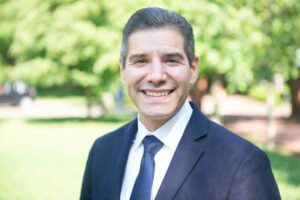John Valverde
President and CEO, YouthBuild USA
Age: 51
Industry experience: 29 years
When John Valverde talks about the power of education as a route to self-betterment, he speaks from personal experience. The CEO of Roxbury-based job training program YouthBuild USA spent 16 years behind bars after being convicted of manslaughter in the 1991 fatal shooting of a New York photographer who allegedly raped Valverde’s girlfriend. Valverde maximized his educational opportunities in prison, earning his bachelor’s and master’s degrees, and founded a college-level certificate program now known as Rising Hope. The CEO of YouthBuild since 2017, Valverde oversees its hundreds of job training programs for unemployed youths and recently coordinated its relocation from Somerville’s Davis Square to Jackson Square in Roxbury.
Q: How do your own personal experiences with the criminal justice system play into your approach to the position at YouthBuild?
A: I was incarcerated a total of 16 years. I served my first 11-and-a-half at Sing Sing [in New York State] and I was fortunate, actually, to be in a maximum–security facility. It sounds like an oxymoron, of course. But it had proximity to New York City and the range of volunteers who would come into the facility to support the residents with therapeutic and training programs. And because of the proximity to New York City, they were able to run a college program and the professors would come into the facility. I was able to complete my bachelor’s degree there. I had wanted to be a doctor and had gotten a scholarship before my incarceration. That was the one facility in the New York prison system that had a graduate degree program in urban ministry, which is equivalent to social work.
That education was incredibly valuable to me. It helped me find meaning and purpose and develop myself as a person. I would read 75 books a year probably. My first job was at a law firm, after becoming the first incarcerated person in New York state to take the LSAT and be accepted into law school. I never did become an attorney, but I used the first year after my release to explore that.
Q: Where does YouthBuild get its referrals for clients?
A: We work with young people ages 16 to 24 who are out of school and out of work. Over 90 percent of them dropped out of high school, and they are unemployed at the time we engage with them. We started in 1978 in East Harlem taking abandoned buildings and rehabbing them to create affordable housing for the community. That’s how YouthBuild was born. We now have 300 sites all over the world: 244 in the U.S. and 20 other countries.
The feeder for all of this has become the success of the students who come before them and succeeded. Word of mouth is actually the most powerful recruitment tool we have. We also have feeders from the criminal justice system. Some may be on probation and the court says, “You know what you need? You need a program like YouthBuild. If you take YouthBuild, we’ll drop everything.”
Q: What’s the format of the program?
A: These folks have left school and a system that probably wasn’t designed for all of the barriers they are dealing with, and the challenges that come with poverty. A way to address that is 50 percent classroom time, 50 percent hands-on time. It lasts nine to 12 months on average, focusing on education, career training, service to community and life skills such as financial training and mentoring.
Q: How does YouthBuild connect its graduates with employers?
A: We work with the Home Builders’ Institute, and Prudential is an employer partner. We do our best to take folks who are involved with us because of corporate social responsibility projects and turn that into employment opportunities. Every program has an employment focus. Once you graduate, there’s employment support. In Massachusetts, we have 12 programs and most of them have 30 or 40 students a year.
Q: How has COVID-19 affected this year’s programs?
A: The hands-on portion has been really impacted by shutdowns and social distancing. We’re really grateful that we’ve been able to use Zoom for the classroom components, and the Home Builders Institute even has developed an online training and certification program for students. The young people are saying to us, “We feel so grateful that our program is open even though we have to wear masks every day. We’re so grateful to have a place where we can go and learn and feel safe.” You can imagine how many of them live in a one- or two-bedroom apartment with eight people and what that means during COVID.
Q: Beyond construction, which careers does YouthBuild offer training programs for?
A: Every YouthBuild program must have a construction component. What has shifted in the last six to eight years: you’re now including information technology, health care and hospitality.
Q: Along with YouthBuild’s recent relocation to Roxbury, the organization recently rebranded its logo and web site. What do the changes reflect?
A: We’ve been around for 42 years and some of our directors have joked if we were Coca-Cola, we would have rebranded eight times by now. We’re no longer just construction. We’re no longer just about high school equivalence. We offer diplomas. We do financial capability and substance abuse training and life skills. The world has changed so much. YouthBuild programs can become charter schools, so they can offer a diploma. The diploma does have more value than the equivalency for many employers.
Q: What was the impetus for the move to 1785 Columbus Ave. in Roxbury?
A: We were in discussions with different groups including Watermark Development early on, and when they told us about this project, that it would be a brand-new nonprofit hub focused on children and families, partnering with Horizons for Homeless Children, it just felt right to be in a community where we can contribute in a different way than Davis Square. With COVID exposing all these disparities and issues that YouthBuild addresses, it feels right for the headquarters of a global movement.
Last Five Books Valverde Has Read:
- “From the Ground Up” by Howard Schultz
- “Decolonizing Wealth” by Edgar Villanueva
- “How to be an Anti-Racist” by Ibram X. Kendi
- “Talking to Strangers” by Malcolm Gladwell
- “Dare to Lead” by Brene Brown






